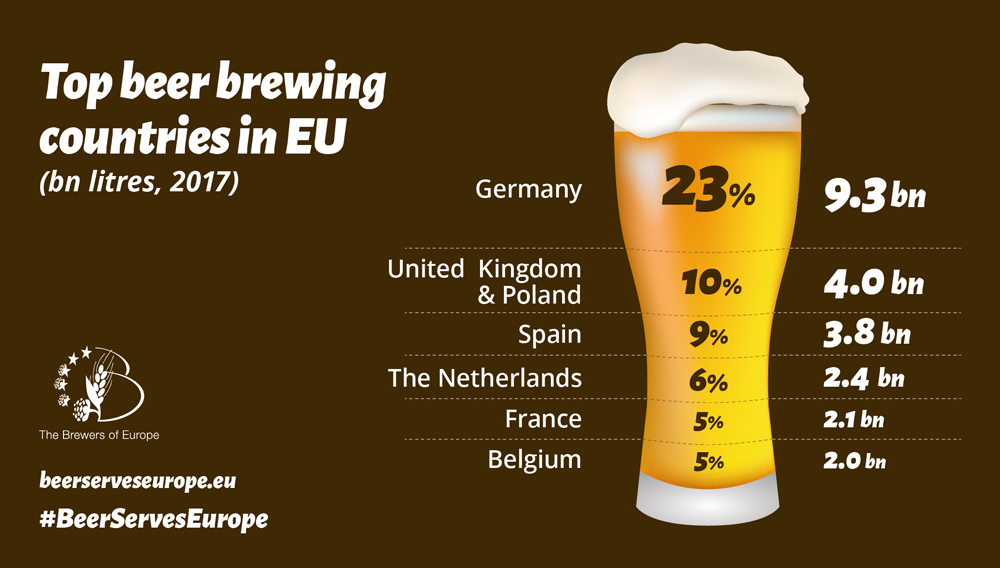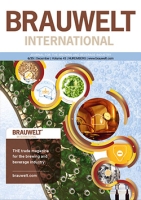Exports boost Europe’s beer production to eight-year high
Europe’s beer production rose to an eight-year high in 2017 bolstered by record exports, a rise in micro-breweries and increased low-alcohol products.
According to The Brewers of Europe’s latest report on Europe’s beer sector, production increased by 2 million hl to 39.6 billion litres, exports reached an all-time high, with one in five beers shipped abroad and a third of that to outside the EU.
With a production of 9.3 billion litres, Germany was the top producer – one in every five beers produced in the EU originates from Germany, followed by the United Kingdom and Poland (both at 4 billion litres produced, each representing 10% of the total).
Other countries making a high volume of beer were Spain (3.8 billion litres, or 9%), The Netherlands (2.4 billion litres, or 6%), France (2.1 billion litres or 5%) and Belgium (approximately 2 billion litres or 5%).
Compared with 2016, Portugal (+8%) recorded the highest increase in the production of beer, followed by Italy (+7%), Slovakia and the United Kingdom (both +6%) and Cyprus (+5%).
In addition, the EU now produces nearly 900 million litres of non-alcoholic beer (2% of all beer, defined as beer that is 0.5% abv or lower) each year, according to the data collected by Eurostat for 2017, whilst production of lower alcohol beers is also growing. This, coupled with the rise in the number of microbrewers and SMEs over the past year, shows how consumer demand is evolving and how the sector is diversifying to meet it. Around 3 quarters of the 9,500 breweries are microbreweries and SMEs. With 2,430 breweries, the United Kingdom has the highest number of breweries in the EU, followed by Germany (1,492), France (1,100), Italy (868) and Spain (521).
Consumer demand is evolving
It is interesting to note that the increase in beer consumption over the last four years has coincided with a drop in overall alcohol consumption, binge drinking and adolescent drinking.
This demonstrates that a shift towards beer, a typically low alcohol beverage, coupled with the increased availability of even lower alcohol and non-alcoholic beers, is compatible with and maybe even contributing to the improved consumption patterns of Europe’s ever more health-conscious citizens.
Leading by example, Brewers are also committed to transparency so consumers can make informed choices about their beer. By the end of this year, two-thirds of Europe’s beer will be labelling ingredients and over half will be voluntarily labelling calories in the same way that other food and drink products already have to do. The commitment to voluntarily provide understandable, recognisable, comparable and accurate consumer information is just one of the 100+ responsibility commitments made by Europe’s brewers under the Beer Pledge.
A 2018 Reputation Institute survey of over 10,000 Europeans of legal drinking age in 12 countries found that nearly half are making moderate alcohol consumption part of their lifestyle or culture and now recognise the innovative low- and no-alcohol options offered by brewers.
Beer serves Europe and the world
Europe’s brewers call for a sustainable tax regime that recognises beer's positive impact throughout the value chain, from ‘grain to glass’. Throughout the value chain, our 9,500 breweries generate around 2.3 million jobs in Europe. Governments across the EU raise nearly EUR 42 billion in tax revenues generated by brewing, including € 10.9 billion in excise duties on beer. The brewing sector injects EUR 50 billion into the European economy overall, or the equivalent of the Luxembourg GDP.
As one of Europe’s premier cultural exports, beer is enjoyed around the world – supporting the sector and creating jobs at home. Many member states have increased their exports, now 8.7 billion litres of beer brewed within the EU is shipped abroad.
Beer exported beyond the EU was worth EUR 3.4 billion last year. The top destination countries outside the EU for Europe’s brewers are the US, China and Canada, but over the past twenty years Europe’s brewers have extended beer trade to 123 countries around the world.
Belgium and Germany are Europe’s biggest beer exporters, with 1.5 billion litres shipped abroad by each country last year, of which over a third to countries beyond the EU. These two countries are followed closely by The Netherlands, then France and the United Kingdom.
Source
BRAUWELT International 2019


